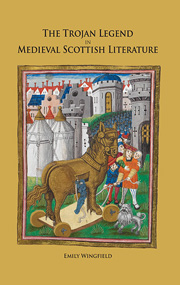Book contents
- Frontmatter
- Dedication
- Contents
- Illustration
- Acknowledgements
- Abbreviations
- Introduction
- 1 Troy in the Older Scots Historical Tradition
- 2 Troy in the Older Scots Romance and Nine Worthies Tradition
- 3 The Scottish Troy Book
- 4 Chaucer's Troilus and Criseyde and Henryson's Testament of cresseid
- 5 Gavin Douglas' Eneados
- Conclusion
- Appendix
- Bibliography
- Index
5 - Gavin Douglas' Eneados
Published online by Cambridge University Press: 05 March 2014
- Frontmatter
- Dedication
- Contents
- Illustration
- Acknowledgements
- Abbreviations
- Introduction
- 1 Troy in the Older Scots Historical Tradition
- 2 Troy in the Older Scots Romance and Nine Worthies Tradition
- 3 The Scottish Troy Book
- 4 Chaucer's Troilus and Criseyde and Henryson's Testament of cresseid
- 5 Gavin Douglas' Eneados
- Conclusion
- Appendix
- Bibliography
- Index
Summary
This final chapter examines The Eneados, the first complete translation of Virgil's Aeneid into English produced in 1513 by the Scottish poet and bishop of Dunkeld, Gavin Douglas (c. 1476–1522). It focuses on the way in which Douglas uses the Trojan legend to reflect, like Henryson, on issues of literary authority and poetic truth, and, like the authors of The Bruce, The Scottish Troy Book and the Older Scots romance tradition, on issues of good self and public governance of both general relevance and speciic applicability to the contemporary Scottish political climate.
I begin by comparing two records of Douglas' response to the Trojan legend that frame, in chronological terms, his translation of the Aeneid: firstly, Douglas' earlier allegorical poem, The Palice of Honour, which contains numerous references to the Trojan legend and its most significant characters, and secondly, Polydore Vergil's account in his Historia Anglica of a personal conversation with Douglas about the Scota-Gaythelos origin myth. The remainder of the chapter focuses directly on the Eneados. It demonstrates how Douglas – like Henryson and Wyntoun – used the Trojan legend to reflect on some of the particular difficulties of authorship facing him, such as writing in the vernacular or constructing a coherent narrative out of a seemingly contradictory literary tradition, and it is argued that Douglas wrote his Eneados in part as a lesson in how to read.
- Type
- Chapter
- Information
- The Trojan Legend in Medieval Scottish Literature , pp. 150 - 177Publisher: Boydell & BrewerPrint publication year: 2014



